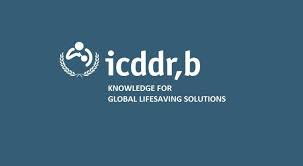Based in Dhaka, Bangladesh, the International Centre for Diarrheal Disease Research, Bangladesh (icddr,b) is an international health research institute committed to solving public health problems facing low- and middle-income countries through innovative scientific research – including laboratory-based, clinical, epidemiological and health systems research. By developing, testing and assessing the implementation of interventions specifically designed for resource-poor settings, icddr,b aims to improve the health and wellbeing of people living in the world’s poorest nations. For more than 50 years, the institute has been carrying out high-quality research and promoting the uptake of evidence-based interventions. Initial focus of the institute was on diarrheal disease, but now studies range from multiple infectious diseases, other threats to public health to methods of healthcare delivery etc. Work of icddr,b has had a profound impact on health policy and practice both locally and globally – and this remains the key objective of the institute for the future. And the institution has received various awards and accolades in recognition of its commitment to support improving the global health situation; the latest being the Hilton Humanitarian Prize in 2017. icddr,b is also the first ever recipient of the Gates Award for Global Health.
Site Director
Dr. Firdausi Qadri, Senior Director, Infectious Diseases Division, Head, Mucosal Immunology and Vaccinology Laboratory, icddr,b
fqadri@icddrb.org
Dr Qadri leads the Infectious Diseases Division in the planning and implementation of research related to the research priorities of icddr,b. She also heads the Mucosal Immunology and Vaccinology laboratory. Her work includes basic and applied immunology of infectious diseases but also clinical and large field based studies on enteric vaccines. Special interests are infections caused by V. cholerae, ETEC, Salmonella spp and Helicobacter pylori. The results have produced an impact in the field of enteric diseases specifically in the area of immunological and genetics and genomic mechanisms, diagnostics and vaccine development.
Site Mentors
Dr. Taufiqur Rahman Bhuiyan, Scientist, Mucosal Immunology and Vaccinology Laboratory, icddr,b
taufiqur@icddrb.org
Dr. Bhuyian’s recent research interest has been in microbiology and immunology of enteric infections, eg. V. cholerae, ETEC, and Helicobacter pylori. He is currently working on functional T cell studies in understanding the immunological basis of different enteric infections in Bangladesh and protection.
Dr. Fahima Chowdhury, Associate Scientist, icddr,b
fchowdhury@icddrb.org
Fahima Chowdhury MBBS, MPH is an Associate Scientist in the Division of Enteric Respiratory Infection for Infectious Diseases Division. She completed her MBBS at Mymensingh Medical College Bangladesh 1994 and Internship training in medicine, gynecology and obstetrics from Sir Salimullah Medical College and Mitford Hospital (SSMCH), Dhaka. She also received one year post graduate training in Pediatrics Medicine from SSMCH, Dhaka in 1997. After her post graduation training, Dr. Fahima completed fellowship training in Clinical Management of Diarrhoeal Diseases and Research Methodology at icddr,b which includes pediatric medicine, internal medicine and gastroenterology. She also obtained a Masters in Public Health from in 2007 with a focus on Epidemiology and Biostatistics.
Dr. Shams El Arifeen, Senior Director and Senior Scientist, Maternal and Child Health Division, icddr,b
shams@icddrb.org
Dr. Arifeen is the first Senior Director of the Maternal and Child Health Division at icddr,b. He has over 35 years of experience in maternal, newborn and child health, health services and health systems, including nine years in government health services, with a focus on health interventions for developing populations. Dr. Arifeen has extensive experience in research, and evaluations, with expertise in community and facility-based evaluations of interventions and programmes that address the commonest causes of illness and death among mothers and children, implementation research to improve the delivery of services as well as in developing monitoring systems.
Dr. Jena Derakhshani Hamadani, Emeritus Scientist and Pediatrician, icddr,b
jena@icddrb.org
Dr. Hamadani is an Emeritus Scientist and a Pediatrician at the International Centre for Diarrhoeal Disease Research, Bangladesh (icddr,b). Her research interests are assessing impacts of nutritional deficits, toxins, poor health and deprivation on development of underprivileged children in developing countries and on designing and evaluating innovative, low-cost and sustainable means to improve the situation.
Dr. Ashraful Islam Khan, Scientist, icddr,b
ashrafk@icddrb.org
Dr. Khan’s research has focused on control of cholera including host-pathogen interactions in V. cholerae infection, identification of immunologic correlates of protection among household contacts of cholera patients and also helps clinical guideline for the management of diarrhea patients. In recent years, he has focused on the project activities entitled “Enteric Disease Surveillance and cholera surveillance in Bangladesh” in 22 sites covering the seven divisions of Bangladesh with the collaboration of IEDCR/GoB. Dr. Khan is also involved in mHealth: smartphone-based decision-support tool in a cluster randomized controlled trial (cRCT) to determine the effect of the method of decision-support on clinical guideline adherence for the management of diarrhoeal diseases in 10 district hospitals in Bangladesh.

